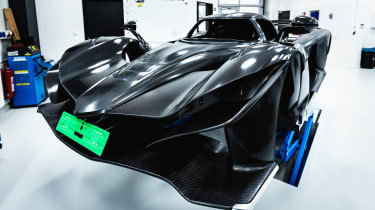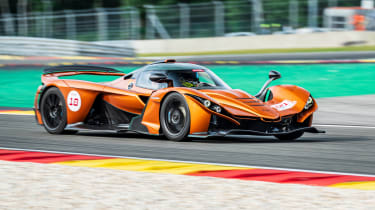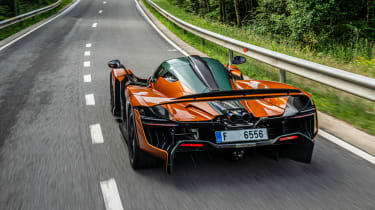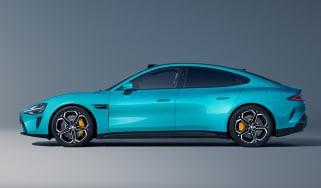Praga Bohema: price, specs and first deliveries
The track-focused Bohema hypercar is ready to hit the road, with production officially underway ahead of first deliveries later this year
With a CV that includes the 390bhp R1R, Praga is turning up the heat with an altogether more extreme street-legal track car: the Bohema. Costing c£1.17 million apiece, the Bohema is a high-downforce two-seater with a carbonfibre chassis and 700bhp, thanks to a Nissan GT-R-derived twin-turbocharged V6, and it's almost ready to hit the road.
Just over a year since it unveiled the prototype, Praga has announced that the first production-spec cars have now entered production following an intensive road and track development programme throughout 2023. A total of 89 units are set to be produced by the end of 2027, with the first to hit the road after its debut this spring.
> Praga Bohema review – 713bhp/ton hypercar put to the test
Tomas Kasparek, owner of Praga Cars, said; 'This is an important milestone for Praga in our long 117-year history. We’re especially proud to be commencing production only one year after revealing the Bohema prototype car. We are monitoring every stage of the build process very closely to make sure that the Bohema production car matches, and even exceeds, our customers’ expectations.'
Praga Bohema specs
Like the R1R that came before it, the Bohema draws heavily from Praga’s motorsport efforts, distilling elements of its competition cars into a road-going model. As such, keeping weight to a minimum is key in its design, with every element scrutinised to reduce mass.
The cabin, for instance, might be more commodious and comfortable than any Praga before it, but it’s built up from just 56 individual pieces of carbonfibre that together weigh just 34kg. All-in, Praga has targeted a weight figure of just 986kg wet, with an empty fuel tank.
The suspension is a pushrod setup with passive coilovers that are mounted horizontally to help keep the bodywork as low to the ground as possible. These are hooked up to bespoke carbonfibre wishbones and control arms. The standard wheels and tyres are a staggered 18- and 19-inch setup running a set of Pirelli Trofeo R tyres, but a full set of 18-inch wheels are available to suit full racing slicks for track use. The braking package consists of 380mm carbon ceramic discs on the front axle, gripped by six-piston calipers.
Its engine is sourced from Nissan, who ships factory fresh twin-turbocharged 3.8-litre V6 units directly to British tuner Litchfield. Here, the engines are converted from wet to dry-sump, helping reduce the height of the engines by 140mm and ensuring consistent oil supply during hard cornering on track. Litchfield also replaces the turbos, to which a bespoke titanium extractor and exhaust system are then bolted. At its basic specification, the Bohema is rated to 700bhp at 6800rpm, with torque peaking at 535lb ft between 3000 and 5000rpm.
The engine is then connected to a six-speed semi-automatic transmission from Hewland, who has specifically designed helical cut gears and internal reinforcements to keep things resilient while being more refined for road use. This, together with the engine, is mounted in its own dedicated subframe, rather than the carbon structure itself, again for the benefit of on-road refinement.
Praga hasn’t detailed specific performance figures, aside from the fact it’s capable of over 186mph despite its aggressive aero package. This aero has been honed with the use of an F1 wind-tunnel, and is capable of creating up to 900kg of downforce at 155mph.
To reinforce the Bohema’s on-road practicality, Praga has created two dedicated luggage spaces just ahead of the rear wheels. Like that seen in a Pagani or the McLaren F1, there are dedicated cases specifically shaped to fit these voids. Interior ambiance has also been paid attention to, with new milled controls, soft Alcantara and coordinating stitching.
Praga Bohema price and first deliveries
The Praga Bohema costs from c£1.17m million with 89 units to be produced by the end of 2027, referencing the company’s victory in the 1000 Miles of Czechoslovakia endurance race 89 years ago. The Czech marque says it will manufacture a maximum of 20 units annually, and will deliver the very first customer example in the first half of 2024.








